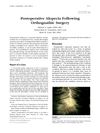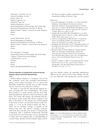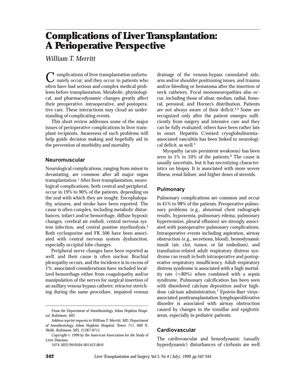TLDR Liver transplant can lead to neurological, pulmonary, cardiovascular, and renal complications, with older patients facing higher risks.
In the 1999 review, William T. Merritt highlighted the range of complications associated with liver transplantation during the perioperative period. Neurological complications were seen in 19% to 90% of patients, pulmonary issues in 41% to 98%, and cardiovascular and renal dysfunctions were also common. Older patients had lower survival rates due to nonhepatic causes, while blood product replacement posed risks due to coagulopathy. Postoperative alopecia was noted as a complication of lengthy surgeries. The review stressed the need for awareness of these complications to enhance patient care.
13 citations
,
November 2015 in “Journal of anesthesia” A woman permanently lost hair on her scalp after a long surgery.
 9 citations
,
August 2008 in “Journal of Oral and Maxillofacial Surgery”
9 citations
,
August 2008 in “Journal of Oral and Maxillofacial Surgery” A woman experienced temporary hair loss after jaw surgery, which can be reduced by careful head positioning during the operation.
 3 citations
,
July 2018 in “Journal of Oral and Maxillofacial Surgery”
3 citations
,
July 2018 in “Journal of Oral and Maxillofacial Surgery” Hair loss can occur after oral surgery, likely due to stress and pressure on the scalp, and usually gets better on its own.
 10 citations
,
March 2014 in “International Journal of Dermatology”
10 citations
,
March 2014 in “International Journal of Dermatology” A hand-held dermatoscope helped differentiate between pressure-induced alopecia and alopecia areata in a young patient, who then experienced hair regrowth within a month.
24 citations
,
July 2014 in “British Journal of Anaesthesia” Long surgeries can cause temporary hair loss due to pressure on the scalp.
 11 citations
,
August 2010 in “Journal of Dermatology”
11 citations
,
August 2010 in “Journal of Dermatology” Hair transplantation can effectively treat stable eyebrow hair loss in alopecia areata patients.




